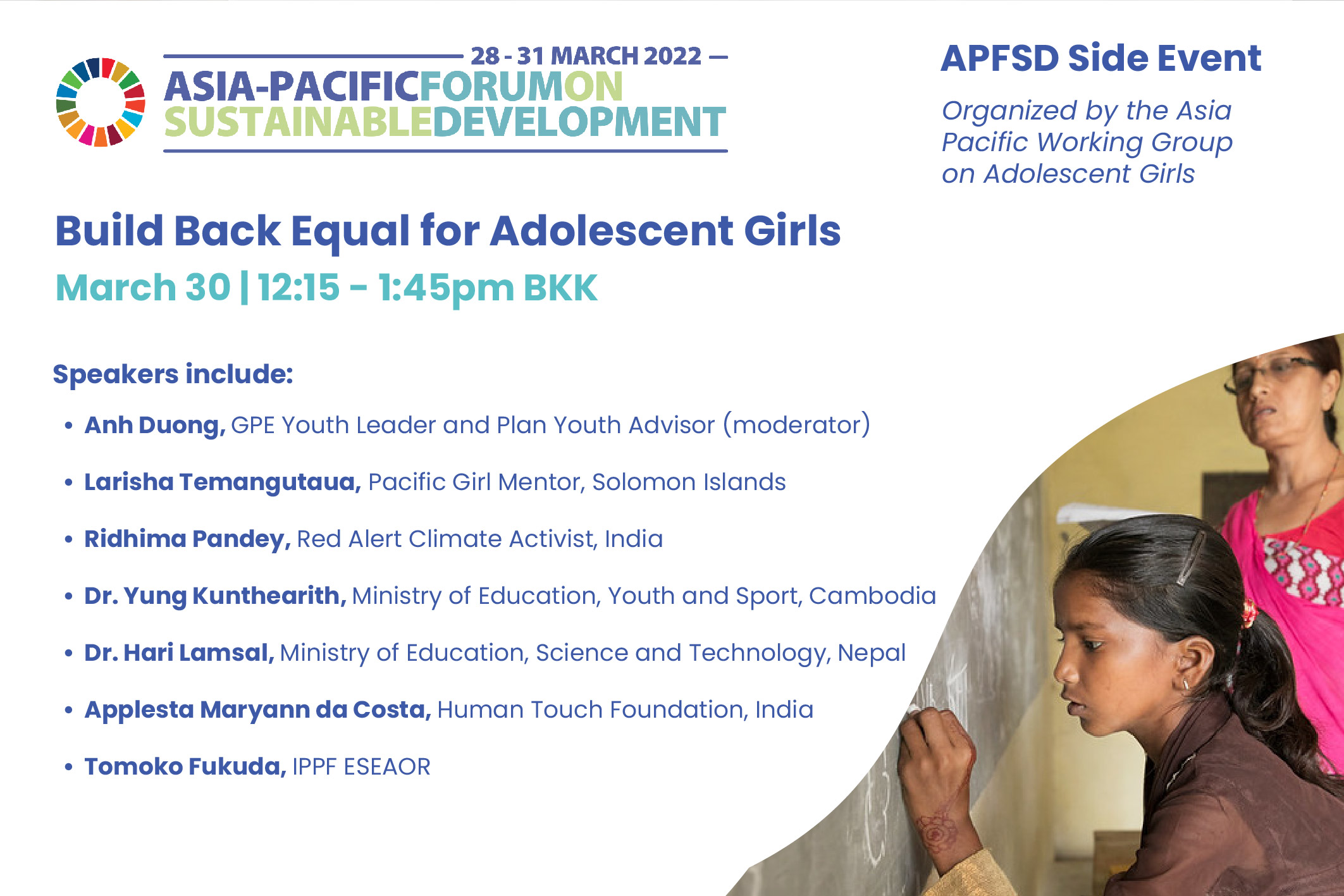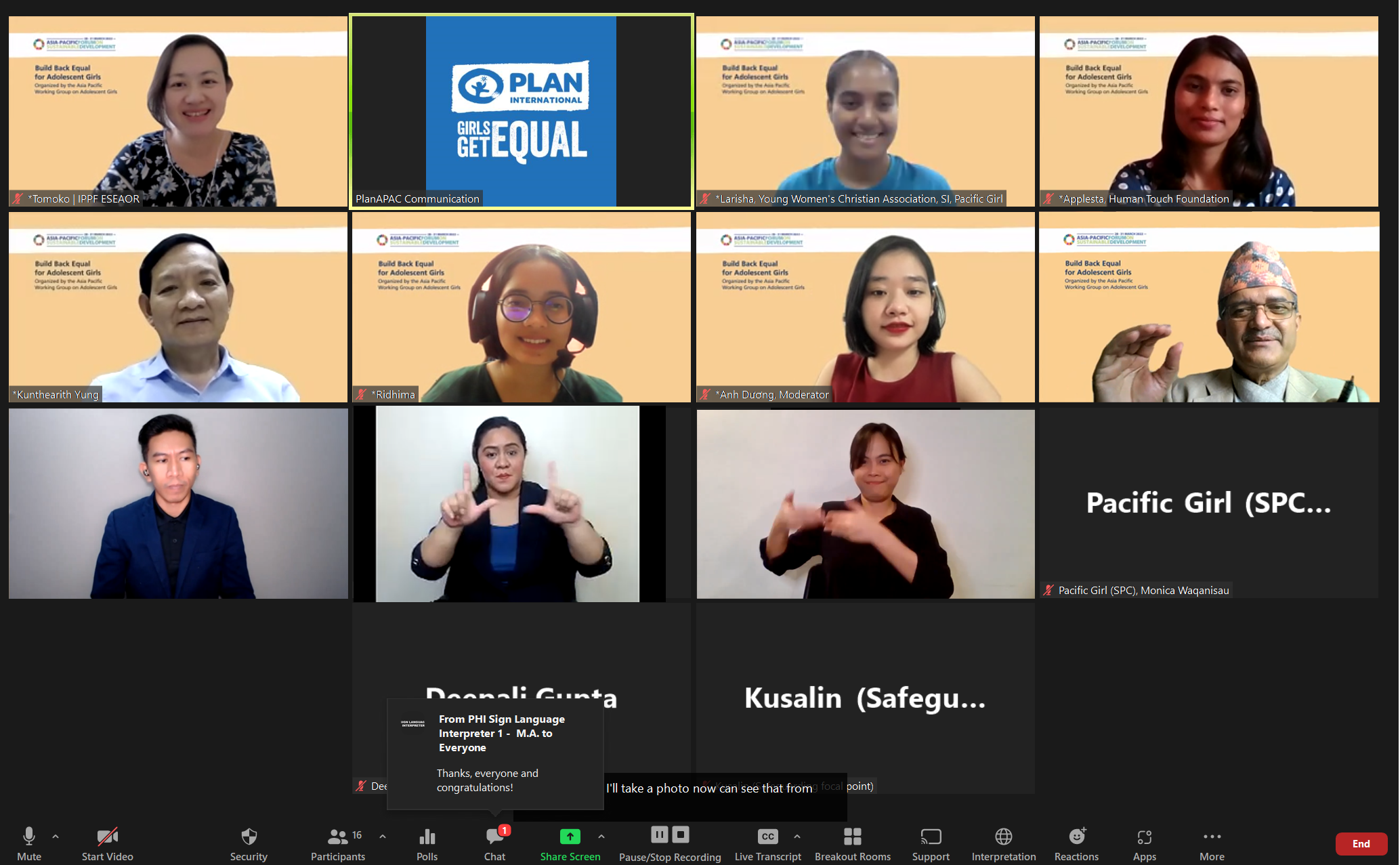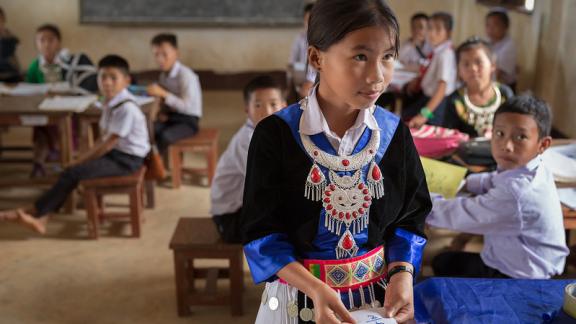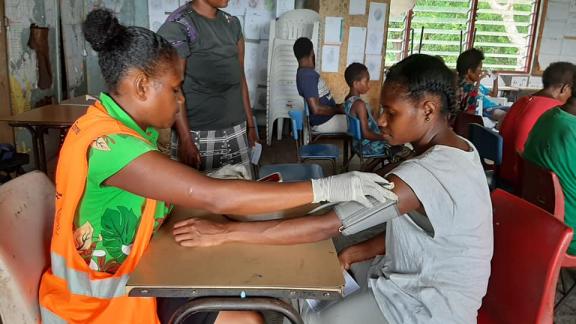
On March 30, 2022, the Asia Pacific Working Group on Adolescent Girls (AP WGAG), hosted a virtual side event alongside the 9th Asia-Pacific Forum on Sustainable Development. The AP WGAG co-chairs, IPPF ESEAOR and Plan International Asia-Pacific, along with the Global Partnership for Education (GPE) and other partners, organized Build Back Equal for Adolescent Girls.
The session aimed to highlight the impacts of the COVID-19 pandemic and other crises on adolescent girls’ health, education and well-being and to share best practices and policy recommendations.
Anh Duong, a GPE youth leader and Plan International youth advisor from Vietnam, moderated the panel consisting of youth activists and decision makers.

The pandemic is impacting adolescent girls in many ways
Adolescent girls from around the region called attention to the varied impacts of the pandemic. We heard repeatedly that the pandemic is creating a mental health crisis. Applesta Maryann da Costa from India’s Human Touch Foundation pointed out that education disruption, rising unemployment and inaccessibility to basic amenities are some of the key factors creating anxiety and depression among youth: “The digital divide has further excluded vulnerable communities that do not have access to technology and contributed to elevated levels of anxiety and stress.”
Adolescent girls are also impacted by humanitarian crises and climate change and play a role in addressing them
In November 2021, during the riots in the Solomon Islands, Larisha from the Young Women's Christian Association used the training she received through the Girls Rise Up program to help her community. She said, “We must put adolescent girls and adolescent girls with disabilities at the forefront of all our interventions.”
Ridhima, a young climate activist and president of Save the Children’s Red Alert Network, is fighting the climate crisis in India. She spoke of solutions by women leaders to mitigate the impacts of climate change and emphasized, “It is important to provide a platform and give girls and women [equal] opportunities.”
She added, “We have to change the gain maximization for a few, to risk minimization for all. We need to work together as a collective and solve these problems based on the advice given by the experts.”
Some governments and organizations are finding solutions that work
Gender-responsive education planning
Dr. Hari Lamsal, joint secretary of the Ministry of Education, Science and Technology, shared Nepal’s success in reaching gender parity in school. However, despite national-level progress, disparities persist at the subnational level and across different communities. “We realized there is a need to develop a composite index, which can trigger resource allocation and strategic interventions.” The ministry, with support from UNICEF, the World Bank and GPE, developed the Equity Index to capture disparities in education. The ministry used the index to identify the most disadvantaged areas and provided additional resources for targeted local government efforts, including the (re)enrollment of girls in school through the Girls’ Access To Education (GATE) program.
Comprehensive sexuality education for all
“Education is the backbone and driving force for achieving all development goals,” said Dr. Yung Kunthearith from the Ministry of Education, Cambodia, who shared his government’s commitment to ensuring education policies are inclusive and equal. “Comprehensive sexuality education will be taught from grades 5 to 12. The Cambodian government is also focused on promoting hygiene and sanitation in schools, focusing on menstrual health care for girls.” He also highlighted that even though the education budgets have been under strain during the pandemic, Cambodia still prioritizes the importance of investing in education for all.
Supporting mental health, food security and menstrual hygiene
Applesta shared Human Touch Foundation’s support for adolescent girls during the pandemic, such as telephonic and in-person counseling, door-to-door delivery of anti-retrovirals (ARVs) and scaling up food security programs with support from the Youth Lead Young Key Population Small Grants Program. The foundation also initiated the EcoSwitch Campaign to support adolescent girls and young menstruators from rural communities across Goa with access to sustainable menstrual products.
At the end of the session, the audience shared their reflections and recommendations, with several key themes emerging: opportunities for adolescent girls to engage meaningfully with decision makers, supportive laws, policies and investment at the country level and the need for urgent cross-sectoral action.
Tomoko Fukuda, regional director of IPPF ESEAOR, remarked, “Adolescent girls are the future … Your voices and needs matter. We recognize that adolescent girls are in so many diverse situations, and when they want to make a decision, [it] is influenced by their environment. We need financial commitments and accessible systems for adolescent girls.”
Anh Duong emphasized, “It is time for us to act now for adolescent girls. Policies and programs must be intersectional and address all forms of discrimination faced by them.”
As Larisha aptly said, “…Please think of our needs. We are here, ready to be consulted on how to ensure responses capture the needs of adolescent girls and girls with disabilities.”
Watch the recording here.
*This blog was published on the Global Partnership for Education website.
About the Asia Pacific Working Group on Adolescent Girls
The Asia Pacific Working Group on Adolescent Girls is co-chaired by the International Planned Parenthood Federation East and South East Asia and Oceania Region (IPPF ESEAOR) and Plan International Asia-Pacific. Members include Asia Safe Abortion Partnership, CREA, Care Asia, Save the Children Asia, ECPAT International, GPE, Girls Not Brides, IPPF South Asia, Pacific Girl, Terre des Hommes, UNICEF, UN Women Asia and the Pacific Regional Office, UNFPA Asia and the Pacific Regional Office, YouthLead and YPEER Asia Pacific.
Contact Persons:
Natassha Kaur, IPPF ESEAOR, AP WGAG Co-Chair: [email protected]
Deepali Gupta, GPE, AP WGAG Member: [email protected]
when









